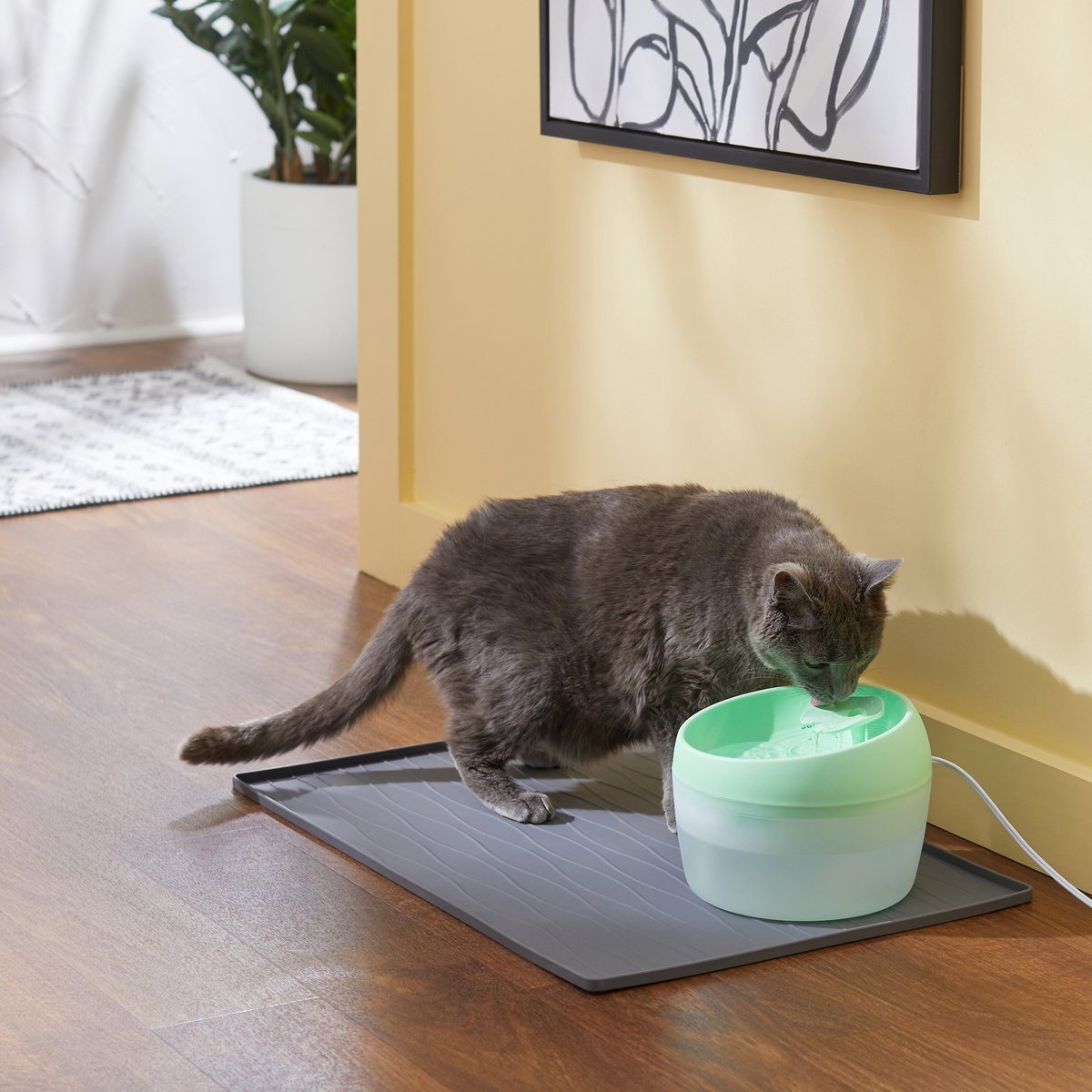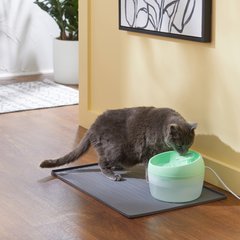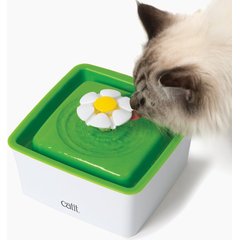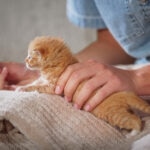Have a Constipated Kitten? Here’s How to Help Your Kitty Poop
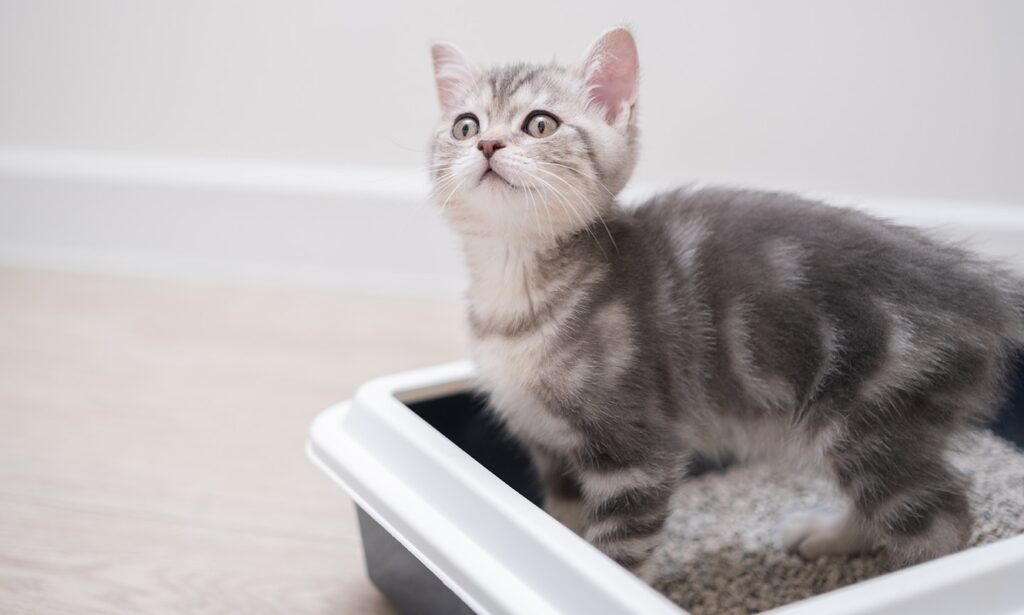
Photo by Irina Kashaeva/iStock/Getty Images Plus
What Is Kitten Constipation?
On a basic level, kitten constipation is when your cat can’t go poop. Generally, constipation gets diagnosed if your kitten hasn’t passed a bowel movement in 24-48 hours.
That being said, dry, hard stools can also be a sign of constipation. In other words, your kitten may be going a little bit, but not enough to fully relieve themselves. Straining and abdominal distress are also closely tied to kitten constipation.
Constipation or obstipation (producing no feces at all) can lead to serious problems such as illness due to being unable to pass stool from the colon and even rectal prolapse if the kitten is straining with too much force to pass stool, says Dr. Byron de la Navarre, DVM, chief of staff at Animal House of Chicago in Chicago.
Signs of a Constipated Kitten
The most obvious sign of a constipated kitten is reduced frequency of defecation, but there are other things you should watch for, too:
- A decrease in or loss of appetite—or complete refusal to eat
- A distended abdomen or an abdomen that appears to be bloated (if kitten is still eating)
- Vocalizing or showing signs of discomfort
- Straining during bowel movements
- Harder stools; dry stools
- Increased mucus and possible blood streaks on the cat poop (often a result of straining)
- Vomiting
- Weakness and lethargy (if constipation progresses)
When Do Kittens Start Pooping? And How Often Should Kittens Poop?
Kittens generally begin pooping shortly after birth, often within 24-36 hours, according to Dr. Brad Hinsperger, DVM, director of Kingsdale Animal Hospital in Kitchener, Ontario.
For the first few weeks, they will poop after each feeding, which could be every 2-3 hours for newborns. As they grow and begin to eat solid foods, this frequency may decrease somewhat but should remain regular.
Ideally, most kittens should go once per day, says Dr. de la Navarre. While the color of the stool can vary with the diet, healthy kitten stool is typically brown in color and has a firm but soft consistency, similar to the texture of Play-Doh.
It can be challenging to determine when a kitten is constipated, because kittens vary in how often they go to the bathroom.
Most young cats defecate once a day, but some—depending on individual differences as well as diet and exercise—may poop more or less often. Plus, there does not seem to be any feline breed predilection for constipation, according to Dr. de la Navarre.
So, monitoring your kitten’s bathroom activities—though perhaps the least enjoyable part of caring for your cat—is important. It lets you know that they are using the litter box regularly.
Kitten Poop Chart
In addition to poop frequency, keep an eye on the consistency and color of the feces. These can provide clues as to what’s going on with your kitten and can reveal whether they might need more urgent care.
If you see notable changes in the consistency and/or color of your kitten’s poop, bring them to the vet for a checkup as soon as you can.
Kitten Poop Consistency: What Does Healthy Poop Look Like?

| Consistency | What it could mean |
|---|---|
| Firm but soft, like Play-Doh | Normal, healthy kitten |
| Dry, hard stool | Constipation or dehydration |
| Loose, watery stool; diarrhea | Dietary changes; infections; parasites |
| Mucousy, fatty stool or blood | Gastrointestinal issues affecting the large intestine or colon |
Kitten Poop Color: What’s Normal?
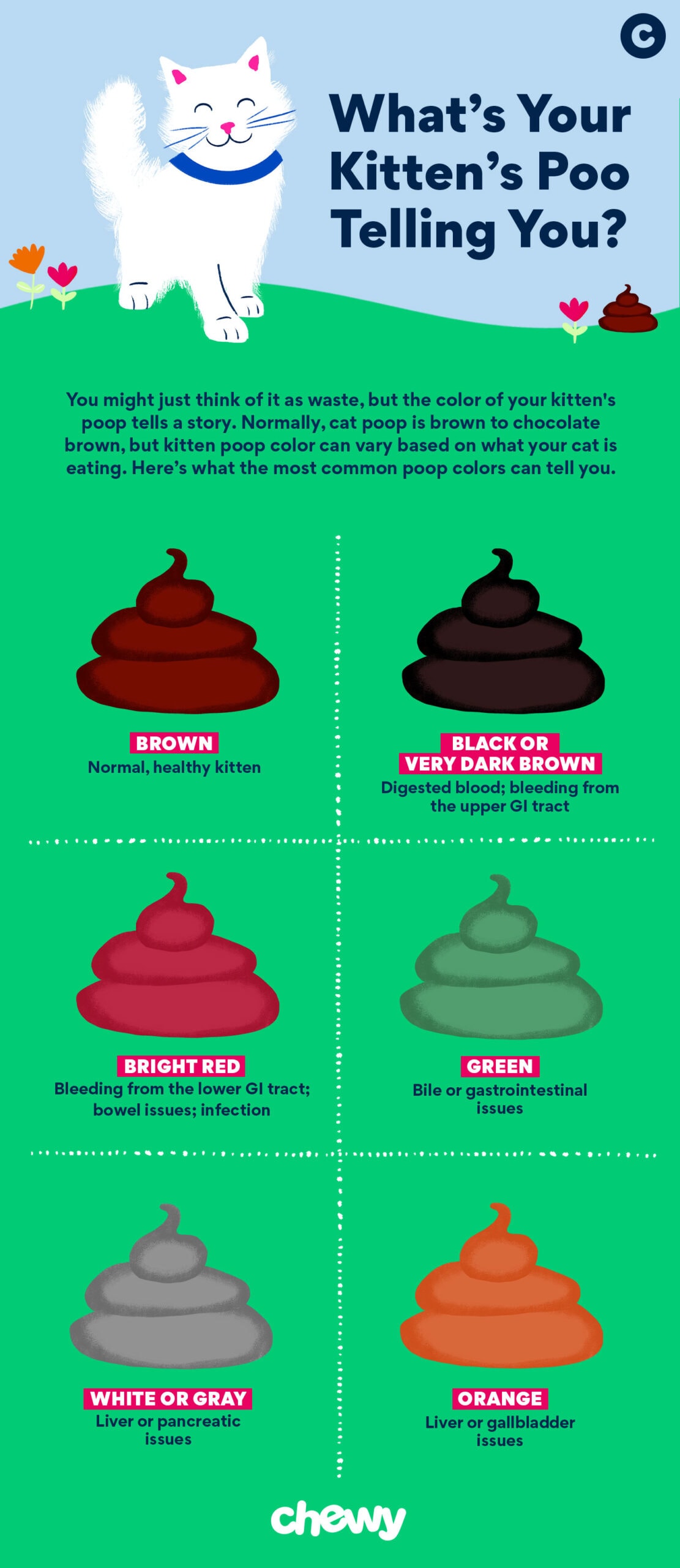
| Color | What it could mean |
|---|---|
| Brown | Normal, healthy kitten |
| Black or very dark brown | Digested blood; bleeding from the upper GI tract |
| Bright red | Bleeding from the lower GI tract; bowel issues; infection |
| Green | Bile or gastrointestinal issues; bacterial infection |
| White or gray | Liver or pancreatic issues |
| Orange | Liver or gallbladder issues |
Why Is My Kitten Constipated?
There are many reasons your kitten may be struggling to poop. Here are some of the common causes of constipation:
- Lack of maternal stimulation: A mother cat uses her tongue to gently clean the anogenital region, and stimulate newborn kittens less than 3 weeks of age to pee and poop. Without the proper stimulation, very young kittens are often affected by constipation. This is common in orphaned kittens and foster kittens who are separated from their mother too soon. Luckily, once they’re a few weeks old, kittens are able to properly pee and poop without this stimulation.
- Dehydration: As kittens transition from nursing to eating kitten food, they may become dehydrated, which can contribute to cat constipation. This is more likely with kittens who are eating dry food.
- Not enough fiber: Fiber helps keep feces moving through the digestive tract. If your kitten doesn’t have enough fiber in their diet, it can slow intestinal transit, contributing to constipation.
- Lack of exercise/weight gain: As young cats develop, lack of exercise and weight gain may contribute to obstipation—a severe form of constipation. Regular exercise and proper diet are important factors in avoiding this and milder forms of constipation.
- Foreign materials and obstruction: Some kittens like chewing on anything and everything. Hairballs and materials from cat toys and other items can all contribute to constipation and may even progress to a blockage. Monitor your kitten’s behavior closely to make sure she does not ingest foreign substances.
- Medical conditions: Several medical conditions, including parasites and megacolon (a chronic condition characterized by a weak colon), can play a role in a kitten becoming constipated.
How to Help a Constipated Kitten and Treatment
If constipation persists for more than a day or two, your kitten is showing signs of distress, or you notice additional symptoms like lethargy, lack of appetite or vomiting, Dr. Hinsperger says you should consult your veterinarian immediately.
If left untreated, constipation can result in rectal prolapse, which presents as a fleshy, red, mass-like lesion protruding from the anus. This is a serious condition and requires urgent veterinary care.
As long as an intestinal blockage/obstruction has been ruled out, your vet may prescribe a mixture of mineral oil and lactulose, which acts as a natural laxative to treat your kitten, according to Dr. de la Navarre.
Lactulose is a synthetic sugar that acts as a stool softener, while mineral oil lubricates the stool to help make it easier to pass. However, you never want to administer mineral oil orally to any animal because it can be very easily inhaled/aspirated and may result in potentially significant respiratory problems; make sure to get your vet’s approval and guidance on this.
If the kitten is too constipated for home care alone, suppositories and enemas can be given at the clinic. Dr. Hinsperger says treatment also often involves hydration, possibly through subcutaneous fluids, and other laxatives or motility medications prescribed by a veterinarian.
In extreme cases when the fecal material is blocking the kitten from defecating, your kitten may need to be sedated to remove the hard feces from the rectum. This is a more invasive procedure, according to Dr. de la Navarre, but if the blockage is successfully cleared, it may prevent a recurrence.
Kitten Constipation Home Remedies
If you want to know how to make a kitten poop at home, good news: There are some home remedies you can try to get things moving.
But it’s important to contact your veterinarian first. Kittens are fragile creatures, and it’s best to consult with a professional if you suspect something isn’t right.
If your vet says your kitten is stable and gives you the green light, there are some tricks you can try.
Hydrate Your Kitten
Your kitten must be drinking water. Make sure that fresh, clean (and preferably, cool) water is always available. This is especially important if your kitten is eating dry food, since a kibble-based diet can increase the risk of dehydration.
You can use a cat water fountain to entice your kitten to drink. Because the water is moving, it’s often more stimulating and prompts the cat to drink, according to Dr. de la Navarre. Filters can also help keep the moving water clean and cool.
If your kitten is not drinking enough water, contact your veterinarian immediately. Do not force your kitten to swallow water using a syringe or squirt bottle. In severe cases of dehydration, your vet may give subcutaneous electrolyte fluids.
Recommended Products
Switch To Wet Food
If you’re feeding your kitten dry food, consider switching to wet food. Wet food is hydrating, softer and easier to digest for some cats. You can also try moistening dry food with a bit of warm water to make it easier for your kitten to digest.
Add Fiber
Along with good hydration, a diet with plenty of fiber can help keep your kitten on a regular schedule.
Dr. de la Navarre recommends canned, unsweetened pumpkin puree, psyllium husks and wheat bran. The pumpkin puree is sweet and often well received by the kitten. To further help the constipated kitten, add water as well as the bran or psyllium to the puree. Consult your veterinarian about the amounts to use.
Prioritize Exercise
Exercise and movement help stimulate the intestinal tract to keep cat food moving through, which can encourage a bowel movement, says Dr. de la Navarre.
Play time also provides much-needed mental stimulation for kittens and teaches them skills they’ll need as they grow into adult cats. It also strengthens the bond you have with your kitten.
Dr. de la Navarre recommends games involving a lot of running to maintain your kitten’s cardiovascular as well as intestinal health.
Continue Observing
If your kitten is showing no improvement two to three days after your initial conversation with your vet, seek veterinary care and have your kitten properly examined.
Diagnosing Kitten Constipation
When evaluating for constipation, a vet will try to determine the underlying causes and relieving symptoms. Dr. de la Navarre says the first step is inspecting the abdomen via palpation and auscultation (listening to internal body sounds). This can help determine how significantly your kitten is affected.
At times, your vet may have to order additional diagnostic tests, including radiographs (X-rays). This is common if your vet suspects that your kitten swallowed foreign material and has a blockage.

